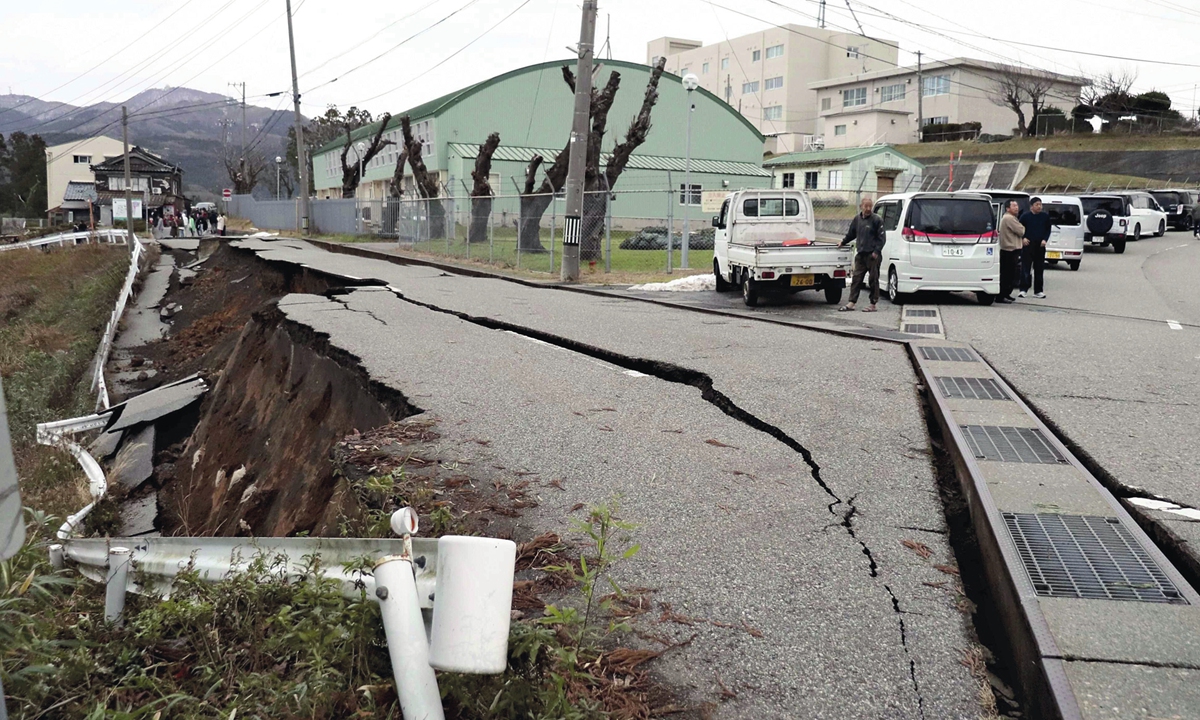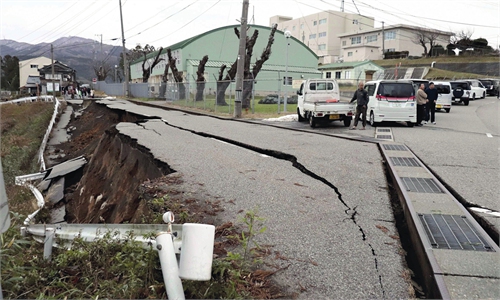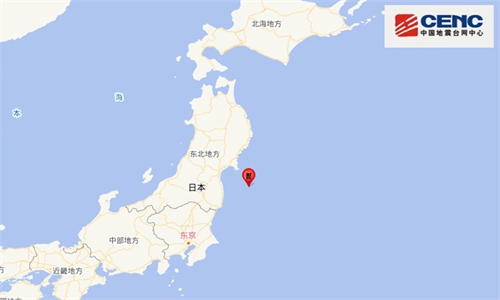Earthquake ‘prediction’ sparks online buzz but Chinese residents in Japan report life unaffected

People stand next to large cracks in the pavement after evacuating into a street in the city of Wajima, Ishikawa prefecture, Japan on January 1, 2024, after a major 7.4 magnitude earthquake struck the Noto region in Ishikawa prefecture in the afternoon. Photo: AFP
A so-called prediction of a major earthquake striking in Japan in July has been circulating online for some time, with some media reports claiming it has shaken tourist confidence and triggered a noticeable drop in travel bookings. However, Chinese residents travelling in Japan told the Global Times that their daily lives remain unaffected and that they have not been swayed by the rumor.
According to Japan's Yomiuri Shimbun, the source of the prediction originated from Japanese manga artist Ryo Tatsuki, who published a comic book in 1999 titled The Future I Saw, based on a collection of dreams she recorded, in what she called her "dream diary." The book's cover included the phrase "A major disaster in March 2011," which some later interpreted as a forewarning of the Great East Japan Earthquake. This sparked renewed interest and debate.
In a revised edition of her work published in 2021, Tatsuki allegedly predicted that "the real catastrophe will occur in July 2025," envisioning a scenario in which "an undersea eruption between Japan and the Philippines causes a massive tsunami that devastates Pacific Rim countries." Since then, the "prediction" has spread widely on social media.
Japan's public broadcaster NHK reported that many online content creators have have capitalized on the viral "July earthquake prediction" by producing sensationalized videos, many of which feature clickbait headlines. Although such videos began appearing as early as 2023, their numbers have surged dramatically this year. To date, over 1,000 related videos have been uploaded online, fueling further public speculation and concern.
TV Asahi also noted that Japan is currently entering a peak season for inbound tourism. However, Hong Kong-based Greater Bay Airlines recently announced it will reduce direct flights to Sendai and Tokushima from May 12 to October 25 — an unusual move during the height of summer travel. The airline attributed the decision to a sharp drop in demand for travel to Japan, driven by widespread rumors of a major disaster predicted to occur in July. It also cited growing economic uncertainty, partially due to tariff policies introduced by the Trump administration in the US, as another factor influencing the reduction in services.
According to Japan's Mainichi Shimbun, a representative from the airline said in an interview that customer surveys indicated a surprisingly high number of people believed the earthquake rumor.
"Many in Hong Kong strongly believe in feng shui, which may reflect cultural differences," the official explained. "To avoid increasing losses on underbooked flights, we had no choice but to reduce scheduled services."
A staff member at a Chinese travel agency in Sendai told Global Times that domestic travel demand within Japan remains strong, with airline tickets hard to book, steep deposit requirements, and hotels and transport services nearly fully booked.
"Some tourists may believe in these 'predictions,' but neither Japanese locals nor Chinese residents in Japan are paying much attention to them," the staffer said. In fact, Chinese tourists typically travel to Japan independently rather than in tour groups, so whether they choose to visit largely depends on individual preferences.
A representative from a Chinese travel agency in Osaka also told Global Times that tourists from multiple countries are still visible across Japan. Based on current vacation rental bookings, there has been a slight decline in domestic platform reservations, possibly because the summer travel season has not yet started.
"Life in Japan remains completely normal, and the so-called 'prediction' has had no real impact," the representative added.
In response to the viral spread of the "prediction," manga artist Ryo Tatsuki told the media, "People should view it objectively. Of course, it's best if nothing happens, but I believe it's important to always be prepared and take precautions. If this helps raise public awareness about disaster preparedness, I think that's a good thing."
The Mainichi Shimbun also quoted Professor Satoshi Kikuchi of Shinshu University, who commented, "We should verify the authenticity of such information and approach it calmly."
According to Japan's Yomiuri Shimbun, it is currently not scientifically possible to predict a major tsunami on a specific date and location. However, disasters can happen at any time. The report recommends that people use this moment to prepare emergency supplies, review local hazard maps and make concrete plans for emergency situations — such as where to evacuate in the event of a tsunami and how to contact family members.




